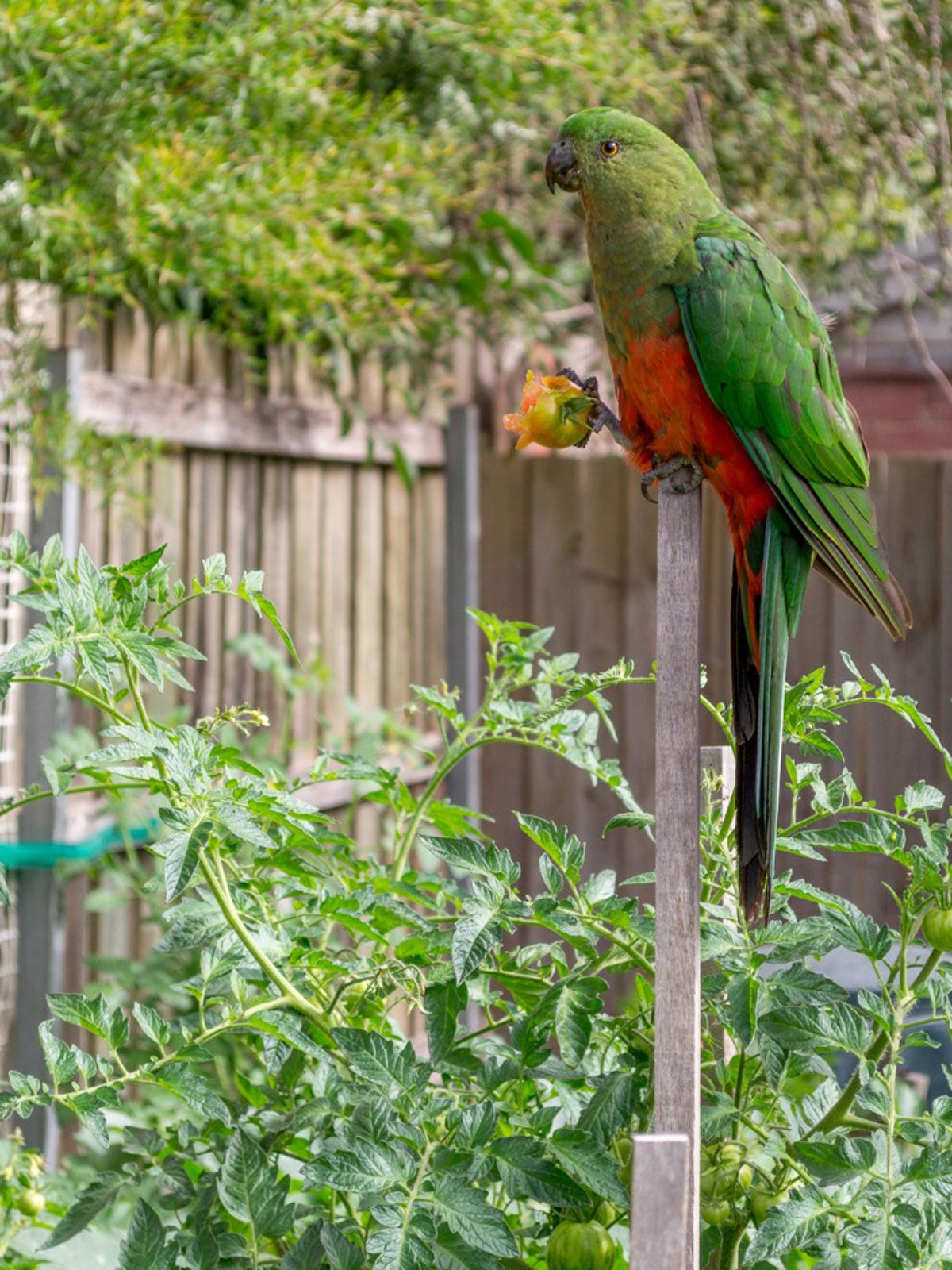To stop birds from eating tomato plants, cover them with a net or apply repellent. Having birds devouring your tomato plants can be frustrating, resulting in reduced yields and damaged fruit.
Luckily, there are effective and humane methods to keep these feathered pests at bay. One option is to cover your tomato plants with a mesh net, creating a physical barrier that prevents birds from accessing the plants and feasting on the fruits.

Credit: www.gardeningknowhow.com
Another approach is to use bird repellents, such as reflective tape or scare devices, which deter birds from landing on or near your tomato plants. By implementing these methods, you can protect your tomato plants from avian intruders and enjoy a bountiful harvest.
Understanding The Problem
Bird damage to tomato plants can be frustrating for gardeners. Understanding the problem and identifying the birds causing the damage is crucial. Recognizing the signs of bird damage on tomato plants is the first step. Look for peck marks, holes in the fruit, or missing ripe tomatoes.
Different bird species may be responsible for the damage, such as sparrows, finches, or even pigeons. To prevent further damage, it’s important to implement effective deterrents and preventive measures. These can include installing bird netting, using scare devices like reflective tape or scarecrow replicas, or even placing shiny objects near the plants.
By taking proactive steps to deter birds, you can protect your tomato plants and ensure a successful harvest. So, let’s take action and keep those pesky birds away from our precious tomato plants.
How to Stop Birds from Eating Tomato Plants : Step by Step Guide
Implementing Physical Deterrents
Bird netting is an effective physical deterrent to protect tomato plants from being devoured by birds. Proper installation of the netting ensures that birds cannot access the plants and feast on the ripe fruit. Another option is to design a scarecrow that mimics a predatory bird, scaring off other birds from approaching the tomato plants.
Additionally, reflective objects, such as shiny streamers or reflective tape, can deter birds by creating flashes of light that confuse and frighten them. By implementing these physical deterrents, you can safeguard your tomato plants and ensure a bountiful harvest. With proper care and attention, you can enjoy the fruits of your labor without worrying about pesky birds ruining your crops.
Natural Remedies And Plants To Repel Birds
Are birds ruining your tomato plants? There are natural remedies you can try. Planting bird-repellent herbs and flowers around your garden can deter them. Sprinkling spicy substances, such as chili powder, near your tomato plants can also keep the birds away.
Another effective solution is to use predator decoys like owls or snakes. These decoys scare off birds by creating the illusion of danger. By implementing these strategies, you can protect your tomato plants from being eaten by birds. Don’t let these pesky creatures ruin your hard work in the garden.
Take action today and enjoy a bountiful tomato harvest!
Attracting Birds To Other Areas
To stop birds from eating tomato plants, you can attract them to other areas of your garden. Building a bird-friendly feeding station will provide them with an alternate food source. Planting bird-friendly plants in a separate part of your garden will also draw birds away from your tomato plants.
Additionally, providing nesting boxes for birds will encourage them to create their homes in those areas instead of near your plants. By offering these attractive options, you can divert birds’ attention and protect your tomato plants from being eaten.
Maintaining A Healthy Tomato Garden
Maintaining a healthy tomato garden involves consistent monitoring and inspection of the plants. Ensure proper watering and fertilization to promote strong and resilient growth. Implementing organic pest control methods is essential to prevent birds from eating the tomato plants. Regularly check for signs of damage or infestation and take action accordingly.
Make sure the plants receive sufficient sunlight and provide support as needed for optimal growth. Avoid using harmful chemical pesticides that may harm the birds or affect the taste of the tomatoes. By following these practices, you can protect your tomato plants from bird damage and enjoy a bountiful harvest.
Frequently Asked Questions For How To Stop Birds From Eating Tomato Plants
How Do I Protect My Tomatoes From Being Eaten?
To protect your tomatoes from being eaten, follow these steps: 1. Install a physical barrier like a fence or netting around your tomato plants. 2. Use organic repellents such as garlic spray or cayenne pepper to deter pests. 3. Introduce natural predators like ladybugs or birds to help control pests.
4. Regularly inspect your plants and handpick any pests you come across.
Why Do Birds Eat Tomato Plants?
Birds eat tomato plants because the bright colors attract them, and they find the fruits tasty.
What Can I Put On My Tomato Plants To Keep Animals From Eating Them?
Cover your tomato plants with a physical barrier like netting or install motion-activated sprinklers to deter animals.
Is It Safe To Eat Tomatoes That Birds Have Pecked?
Yes, it is safe to eat tomatoes that birds have pecked.
Conclusion
To protect your tomato plants from bird damage, it’s important to take proactive measures. By implementing a combination of visual deterrents and physical barriers, you can create an unfriendly environment for birds and keep your plants safe. Start by installing scare devices like shiny reflective objects and wind chimes near your garden.
These will deter birds by creating movement and noise. Additionally, consider using physical barriers like netting or mesh covers to keep birds from accessing your tomato plants. Regularly inspect your garden for any signs of bird damage and make adjustments to your deterrents as needed.
Lastly, implementing companion planting with bird-repellent plants like marigolds and sunflowers can provide an extra layer of protection. By following these strategies, you can successfully prevent birds from feasting on your beloved tomato plants and enjoy a bountiful harvest. Take action now and safeguard your garden!

